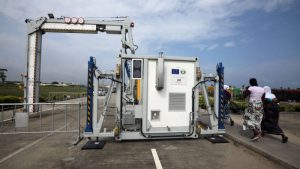Analysts at RenCap, an investment and securities firm declared that the closure of Nigeria’s land borders could lead to a slow-down in Nigeria’s economic growth in 2020. This was contained in an economic research report recently released by the company.
According to RenCap, Nigeria’s economic growth of 2.3% recorded in the third quarter of 2019 was, “…mainly on the back of a recovery in the oil and gas sector, and to a lesser extent financial services,” with the oil sector growing by 6.5% year on year in the third quarter of 2019.
The research firm also explained that the growth recorded in the oil sector, “…was largely due to an increase in oil production to 2.04mn b/d, from 1.93mn b/d,” while “Financial services also emerged from its slump and grew, albeit modestly, by 0.6% YoY in 3Q19, after declining for four consecutive quarters,” suggesting that the CBN’s policy played a major role.
“We think that the Central Bank’s directive to banks to increase their loan-to-deposit ratios (LDR) to 65%, as part of a bid to boost economic growth, partly explains the increase in lending. The pick-up in credit growth to 10.9% YoY in September, from 4.3% YoY a year earlier (see Figure 3), maybe in part attributed to this directive. The telco industry remains the biggest contributor to GDP growth, albeit a tad smaller. The sector grew by a brisk 12.2% YoY in 3Q19, a little slower than 15% YoY a year ago.”
Border Closure drags GDP
Whilst the CBN’s policy may have positively impacted on Nigeria’s third-quarter GDP growth rate, the Federal Government’s decision to keep the borders closed until January 2020 is expected to slow down economic recovery, particularly in the trade sector.
- Nigeria’s trade sector is about the second largest contributor to Nigeria’s GDP but has suffered from poor economic growth since Nigeria’s economic crisis began in late 2014. “We believe the border closures contributed to the decline in wholesale and retail trade in 3Q19” RenCap explains.
- “Trade’s decline partly explains the slowdown in the non-oil sector’s growth to 1.8% YoY in 3Q19, from 2.3% YoY a year earlier. Trade contracted by 1.5% YoY vs 1.0% growth a year earlier. As trade is the second-biggest economic sector, its performance has material implications on GDP growth. Trade declined despite a pickup in consumer confidence.” RenCap
- Unfortunately, growth may remain farfetched for the trade sector if the borders remain closed next year. “We believe the pick-up in inflation, on the back of the border closures, will undermine confidence and demand in subsequent quarters. This will also counter the positive impact of improving credit growth, resulting in a neutral impact on GDP growth.”
The recent inflation report released by the National Bureau of Statistics also revealed that Nigeria’s inflation rate rose by 11.61% year on year in October 2019, the highest in about 18 months. The rise was largely attributed to an increase in the cost of food items following the closure of the borders to cheaper imported goods.
With the full effect of the closed borders still being contemplated, Nigeria’s 4th quarter GDP numbers could be severely impacted, especially if the trade sector continues to cave under pressure from government policies.
A slew of government policies, ranging from border closure to the ban of 41 items, have negatively affected the sector. The Buhari–led government has focused on growing the local industry, backing the unpopular policy direction with executive orders such as the border closure, import-substitution, increase in import tariffs, etc.









